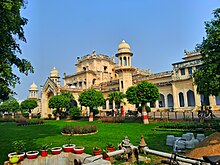
Summary
Darul Uloom Nadwatul Ulama (translated as, House of Knowledge and Assembly of Scholars University) is an Islamic seminary in Lucknow, India.[1][2][3] It was established by the Nadwatul Ulama, a council of Muslim scholars, on 26 September 1898.
 A view of the Darul Uloom Nadwatul Ulama | |
| Motto | إلى الإسلام من جديد (transl. Towards Islam anew) |
|---|---|
| Type | Islamic seminary |
| Established | 26 September 1898 |
| Founder | Muhammad Ali Mungeri |
| Chancellor | Bilal Abdul Hai Hasani Nadwi |
| Principal | Saeed-ur-Rahman Azmi Nadvi |
| Students | 6500+ |
| Undergraduates | 4000 |
| Postgraduates | 1500 |
| Address | 504/21G, Mankameshwar Mandir Marg, Mukarimnagar, Hasanganj. , , Uttar Pradesh , 226007 , India |
| Campus | Urban |
| Affiliations | Nadwatul Ulama |
| Website | nadwa |
This educational institution draws large number of Muslim students from all over the world. Nadwatul Ulama fosters a diverse range of both scholars and students including Hanafis (the predominant group), Shafi'is and Ahl al-Hadith. Additionally it is one of very few institutes in the region to teach the Islamic sciences completely in Arabic.
History edit
Nadwatul Ulama was formed with the aim to bring all the sects of Islam together irrespective of some of their differences in beliefs.[1]
Nadwa means assembly and group, it was named so because it was constituted by a group of Indian Islamic scholars from different theological schools. Darululoom is the educational body of Nadwatul Ulama which was formed in Kanpur in 1893. It was eventually shifted to Lucknow in 1898 and the Islamic curriculum was updated with modern sciences, mathematics, vocational training and the addition of an English Department.[1][4]
On 2 September 1898, the office of the Nadwatul Ulama was shifted to Lucknow. The Darul Uloom Nadwatul Ulama was started on 26 September 1898.[5]
Administration edit
The manager of Nadwatul Ulama serves as the chancellor of Darul Uloom. In 2000, Rabey Hasani Nadwi became the chancellor.[6]
Hafeezullah was appointed the first principal of the Darul Uloom Nadwatul Ulama.[7] In 2000, when Rabey Hasani Nadawi was appointed the chancellor, Saeed-ur-Rahman Azmi Nadvi became the principal.[6]
Publications edit
- Al-Baas Al-Islami: An international monthly Arabic magazine
- Al-Raid: a bi-monthly magazine in Arabic.
- Tameer-e Hayat, a biweekly magazine in Urdu
- Sachha raahi: Hindi-language magazine
Alumni edit
The graduates of the Darul Uloom Nadwatul Ulama are usually referred as Nadwis. The alumni include:
- Abul Hasan Ali Hasani Nadwi
- Wadeh Rashid Hasani Nadwi
- Ijteba Nadwi
- Minnatullah Rahmani
- Mohammad Akram Nadwi
- Rabey Hasani Nadwi
- Sajjad Nomani
- Shihabuddin Nadvi
- Abdur Rahman Kashgari Nadwi
- Sultan Zauq Nadvi
- Syed Sulaiman Nadvi
- Syed Ehtisham Ahmed Nadvi
- Wali Hasan Tonki
- Yasin Mazhar Siddiqi
- Salman Husaini Nadwi
- Shihabuddin Nadvi
See also edit
- Darul Uloom Deoband
- Nahdlatul Ulama
- Jamia Islamia Bhatkal
- Darul Huda Islamic University
- Al-Jamiatul Ahlia Darul Ulum Moinul Islam
- Darul Uloom Karachi
- Jamiah Darul Uloom Zahedan
- Madrasah In'amiyyah
- Deobandi Islamic movement
- List of Deobandi universities
- Jamiatul Hidaya, Jaipur
- National Institute For Islamic And Contemporary Studies
References edit
- ^ a b c Shahid Siddiqui (27 March 2017). "Decolonisation and the Nadwatul Ulama". The News International (newspaper). Retrieved 6 March 2020.
- ^ Edicts issued by Indian maulanas leave Muslim voters confused Dawn (newspaper), Published 14 April 2014, Retrieved 6 March 2020
- ^ "Darul Uloom Nadwatul Ulama, Lucknow, India Accurate Prayer Times أوقات الصلاة, Qibla اتجاه القبلة Mosques (Masjids), Islamic Centers, Organizations and Muslim Owned Businesses". Islamicfinder.org website. 1 January 1980. Retrieved 7 March 2020.
- ^ English Department inaugurated at Darul Uloom Nadwatul Ulama The Siasat Daily (newspaper), Published 5 September 2018, Retrieved 7 March 2020
- ^ Ishāq Jalees Nadwi. Tārīkh Nadwatul Ulama (in Urdu). Vol. 1. p. 212.
- ^ a b "Principal of Darul Uloom Nadwatul Ulama". nadwa.in. Retrieved 7 July 2021.
- ^ Ishāq Jalees Nadwi. Tārīkh Nadwatul Ulama. Vol. 1. p. 220.
Bibliography edit
- Al Ulamaa Al Baarizoona Min Daaril Uloom Li Nadwatil Ulamaa Alladheena Hasaloo Alaa Al Jaayizah At Taqdeeriyya Li Nashri Al Lugha Alarabiyya Wa Aadaabihaa
- Musahamatu darul uloom nadwatul ulama fi nashril lughatil arabiati wal adabil Islami wa dauruha fi majalis sahafati wal elam
- Ansari, Mohammad Asjad (2017). Modern education in Madrasas A perspective study of different schools of thought (Thesis). Jamia Milia Islamia. p. 126–140.
- Ahmed, Fakhar Uddin Ali (2010). Arabic studies in educational institutions of Assam since 1947 (Thesis). India: Gauhati University. pp. 204–208.
- Mujab, Muhammad (2001). Islamic sciences in india and indonesia: a comparative study (Thesis). India: Department of Sunni Theology, Aligarh Muslim University. pp. 84–96. hdl:10603/58830.
- Ishaq Jalees Nadwi (2017). Tārīkh Nadwatul Ulama (in Urdu). Vol. 1. Lucknow: Majlis Sahāfat-o-Nashriyāt.
- Shams Tabrez Khan (2015). Tārīkh Nadwatul Ulama (in Urdu). Vol. 2. Lucknow: Majlis Sahāfat-o-Nashriyāt.
- Ramzan, Shazia; Rubab, Ainee (2017). "A Comprative Study Of The Ideological Orientations And Methodology Of Dar Ul Uloom Deoband, Nadwatul Ulama And Aligarh School". Al Qalam. 22 (1): 1–10. doi:10.51506/alQalam.26(2)279. ISSN 2707-0077. Archived from the original on 21 October 2022. Retrieved 21 October 2022.
- Ullah, Zia; Rahman, Fazl ur; Khan, Sarzamin (2022). "Intellectual and Preachment struggles of Nadwat ul Ulamā (Lucknow India)". Malakand University Research Journal of Islamic Studies (in Urdu). 4 (01): 58–70. ISSN 2708-6577.
- Decolonisation and the Nadvatul Ulema
- Seerat-e-maulana Syed Mohammad Ali Mungeri
- Darul Uloom Nadvat-ul-ulama
External links edit
- Official website (in Urdu)
- Darul Musannefeen Shibli Academi
26°51′54″N 80°55′57″E / 26.8651°N 80.9325°E


